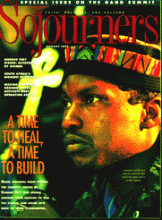Consider how you would feel if you lost a loved one to murder. Would you rethink your views on the death penalty? For members of Murder Victims Families for Reconciliation (MVFR), the answer is no. "Through our own painful experience, we have learned that vengeance is not the answer," said Marie Deans, founder of MVFR. "Capital punishment is an expensive, ineffective, and barbaric response to violent crime. It is not a solution."
For two weeks in June, MVFR members led other abolitionists on a Journey of Hope through Indiana and surrounding Midwest cities to spread their message of forgiveness and compassion and to call for an end to the death penalty in the United States. "For too long, victims' families and death penalty opponents have been positioned on opposing sides," said MVFR board member Bill Pelke, who led a fight to overturn the death sentence of his grandmother's murderer. "With this journey, we hope to join together under a common mission to reduce the violence in our communities."
Through rallies, educational events, and meetings with local officials, participants made special attempts to reach out to those who did not necessarily agree with them and to connect with people on a personal level. The Journey of Hope concluded in Indianapolis with a rally and a march to the State Capitol, followed by an evening concert and celebration. Throughout the tour, MVFR members were joined by local activists and representatives from other organizations including the National Coalition to Abolish the Death Penalty and Amnesty International.
MVFR was founded in 1978 by Marie Deans, after the murder of her mother-in-law, to provide a forum and a voice for families and friends of victims who oppose the death penalty and do not consider it just retribution for the loss of their loved one. The group provides support to those who seek healing and forgiveness instead of revenge.
Read the Full Article

